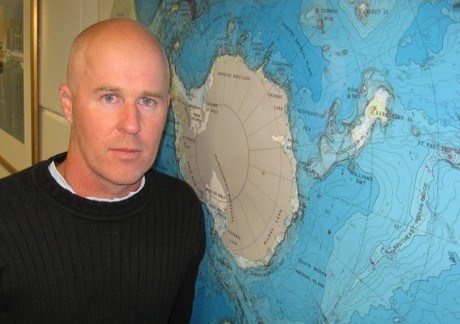Australian climate scientist wins international award

Professor Matthew England, deputy director of UNSW’s Climate Change Research Centre, has won the 2017 Tinker-Muse Prize for Science and Policy in Antarctica for his outstanding research, leadership and advocacy for Antarctic science. The US$100,000 prize, awarded by the Tinker Foundation and administered by the Scientific Committee on Antarctic Research, is presented annually to an individual whose work has enhanced the understanding and/or preservation of Antarctica.
Professor England has been honoured for his “sustained and seminal contribution to Antarctic science through profound insights into the influence of the Southern Ocean on the continent and its role in the global climate system”, according to the prize citation. He is also recognised for his leadership roles in international programs such as the Climate and Ocean: Variability, Predictability, and Change (CLIVAR) project and the Climate and Cryosphere (CliC) project of the World Climate Research Program, where he has demonstrated a commitment to collegiality, capacity building and the global impact of Antarctic science.
“Importantly, Professor England has consistently shown a rare ability to translate global issues to local impacts, and in an engaging and accessible way to the general public,” the prize citation reads.
“He has led the world in championing the importance of Southern Ocean water masses and circulation in global climate, pioneering our understanding of the Southern Annular Mode and its influence on the coupled ocean-ice-atmosphere system, quantifying rates and pathways of the Southern Ocean overturning circulation, and discovering new insights into the physics of tropical high-latitude teleconnections.”
Professor England’s Antarctic research spans oceanography, climate dynamics, atmospheric processes, climate variability, palaeoclimate and ice-ocean interactions. He has written seminal papers on the topics of Antarctic water-mass formation, ocean-atmosphere interactions, Southern Hemisphere climate variability and Southern Ocean ventilation rates, including pioneering work on the use of tracers to evaluate large-scale ocean circulation in the Antarctic region. He has published more than 180 peer-reviewed journal articles during the past 25 years.
Professor England was elected a Fellow of the Australian Academy of Science in 2014 and a Fellow of the American Geophysical Union in 2016. He has also been highly active in teaching, research supervision, media and outreach, lecturing to more than 3000 students and supervising projects for more than 50 PhDs and early-career scientists.
Professor England said he was “delighted to receive this award” and that it will “further focus my efforts to better understand Antarctica’s climate as well as the ocean circulation around the continent, aiming to improve our knowledge of the region’s vulnerability to climate change”.
“Preserving the Antarctic environment requires limiting carbon emissions to keep global warming below 1.5–2°C. We need to ensure this commitment is met. Every fraction of a degree of warming poses a greater risk for Antarctic ice sheet stability and catastrophic sea level rise.”
The award will be officially presented at the 12th International Conference for Southern Hemisphere Meteorology and Oceanography, AMOS-ICSHMO 2018, to be held at UNSW from 5–9 February 2018.
'Myrtle': Australia's new embodied carbon facility
Run by Australian cleantech company MCi Carbon, the facility will transform CO2 into...
Scientists make inroads into sustainable refrigeration
The research involved fine-tuning the compression-absorption cascade refrigeration cycle (CACRC)...
New initiative helps businesses make sustainable packaging choices
The AIP is collaborating with sustainability software company Empauer to offer a comprehensive...











